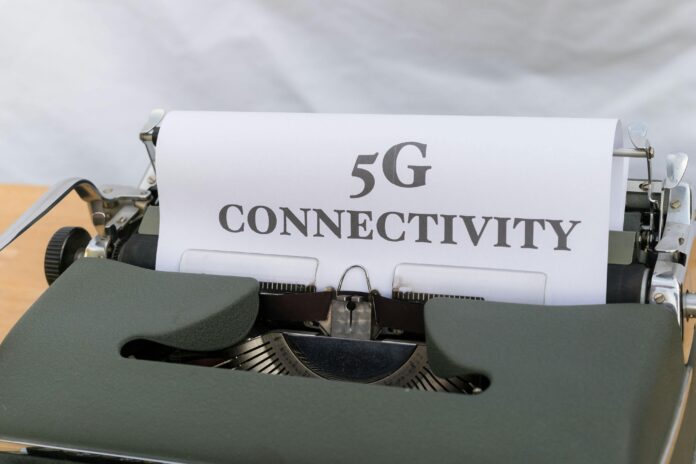The rise of 5G technology, combined with the power of Artificial Intelligence (AI), is set to revolutionize industries, economies, and daily life on a global scale. With speeds exponentially faster than 4G, reduced latency, and greater bandwidth, 5G networks will enable seamless connectivity for billions of devices, facilitating the growth of IoT (Internet of Things), smart cities, and remote operations. However, the integration of AI into 5G also presents new security challenges that must be addressed.
Quick Links
1. Overview of 5G Technology
5G, the fifth-generation mobile network, promises unprecedented speed and connectivity, which will unlock new potential for emerging technologies such as AI, IoT, and extended reality (virtual, augmented, and mixed). This leap forward is akin to the transformative shift from typewriters to computers, revolutionizing how we live and work.
- Speed: 5G can deliver speeds up to 10 Gigabits-per-second, vastly outpacing the 100 Megabits-per-second limit of 4G. This allows users to download high-resolution content in seconds.
- Latency: 5G will reduce latency to almost zero, making virtual interactions, real-time remote operations, and automation much more efficient.
- Bandwidth: 5G’s increased bandwidth ensures seamless connectivity, even in densely populated areas such as stadiums and concerts.
2. The Role of AI in 5G Network Management
AI plays a pivotal role in optimizing the performance of 5G networks by enhancing data analysis, network resource allocation, and security.
- Network Optimization: AI can analyze vast amounts of data related to user behavior and network performance, allowing for dynamic allocation of resources. This ensures efficient service delivery, predicts and prevents traffic congestion, and improves overall quality of service.
- Edge Computing: AI also facilitates real-time data processing through edge computing, reducing latency by processing data closer to its source. This enhances response times and reduces bandwidth consumption.
- Security Monitoring: AI-powered tools can predict, detect, and mitigate security threats by analyzing network traffic patterns and identifying anomalies in real-time.
3. AI and 5G Security Challenges
While AI optimizes and secures 5G networks, it also presents new vulnerabilities. Malicious actors are using AI to conduct sophisticated cyberattacks, threatening the integrity of global 5G infrastructures.
- Cybersecurity Threats: AI enables attackers to automate malware, evade security defenses, and exploit weaknesses in the 5G infrastructure. This includes the manipulation of AI models, which can trigger erroneous processes in network systems.
- Cloud Vulnerabilities: The shift to virtualized 5G networks, where signal processing occurs in the cloud, increases the risk of large-scale security breaches. The interconnectedness of billions of devices further complicates efforts to safeguard networks from attacks.
4. Key Benefits of 5G Technology
Beyond its speed and connectivity, 5G technology is set to transform numerous sectors:
- Smart Cities: 5G and AI will work together to optimize traffic systems, reduce energy consumption, and enhance public safety through intelligent data processing.
- Healthcare: Remote surgeries, powered by 5G’s low latency, will allow doctors to perform complex procedures from afar using virtual reality (VR) headsets and robotic arms.
- Manufacturing: In smart factories, AI-integrated sensors will optimize production processes, reduce downtime, and improve efficiency by enabling real-time data analysis.
5. Global Technological Competition: The 5G Race
The global race to dominate 5G technology is intensifying. Countries are vying for leadership in 5G deployment, as early adoption is expected to provide both economic and strategic advantages.
- Key Players: The leading companies in the 5G market include Huawei (China), Ericsson (Sweden), and Nokia (Finland). Together, these firms hold the majority of global contracts for 5G infrastructure.
- Patent Dominance: Huawei holds more than 1,500 patents related to 5G, giving it a significant edge. Chinese companies, including ZTE, control over 36% of all 5G patents worldwide.
6. 5G and Technonationalism
The global competition surrounding 5G has heightened technonationalism, a trend where nations strive to secure technological supremacy as part of their economic and security strategies.
- Global Division: Tensions between the USA and China exemplify the geopolitical importance of 5G. Nations are forming alliances or seeking alternatives to Chinese technology, often at the cost of efficiency or increased expenses.
- Fragmentation Risk: The global 5G ecosystem could split into competing spheres, driven by political and economic alliances, reducing the interoperability of global technology infrastructure.
7. Economic and Security Implications
5G’s potential to transform industries, improve military capabilities, and boost economies has elevated its importance beyond just a technological advancement.
- Military Applications: 5G will enhance intelligence, surveillance, and reconnaissance capabilities. Its low latency will support the development of autonomous weapons systems and more efficient logistics.
- Economic Impact: While developed nations are quickly adopting 5G, developing countries face significant hurdles, including high infrastructure costs and limited consumer interest. This disparity could widen the global digital divide.
8. Conclusion
The convergence of AI and 5G technology marks a new era of connectivity, one that will revolutionize industries, enhance the quality of life, and introduce new security challenges. As countries compete for dominance in the 5G space, the implications for global trade, security, and governance will be profound. Ensuring the security and equitable deployment of this technology remains a critical challenge for both governments and industries worldwide.
What is 5G technology?
5G is the fifth generation of mobile networks, designed to be faster and more reliable than its predecessors, offering enhanced internet speed, lower latency, and better connectivity for smart devices.
How does 5G differ from 4G?
5G is much faster than 4G, offering data speeds up to 100 times quicker, reduced latency, and the ability to connect a larger number of devices seamlessly.
What industries benefit most from 5G?
Industries like healthcare, manufacturing, transportation, and entertainment are poised to benefit significantly from 5G due to its ability to support IoT, remote monitoring, automation, and real-time data analysis.
How does 5G improve business operations?
Businesses can leverage 5G for faster communication, enhanced cloud computing, automation, and IoT integration, all of which can streamline operations and improve customer experiences.



